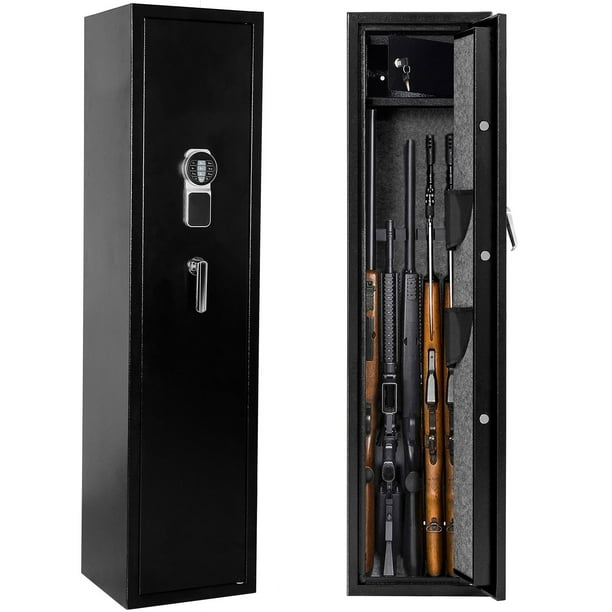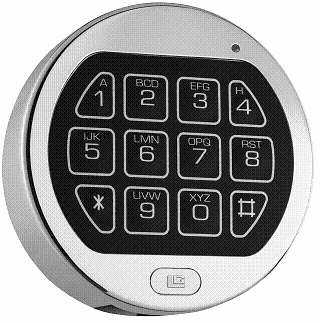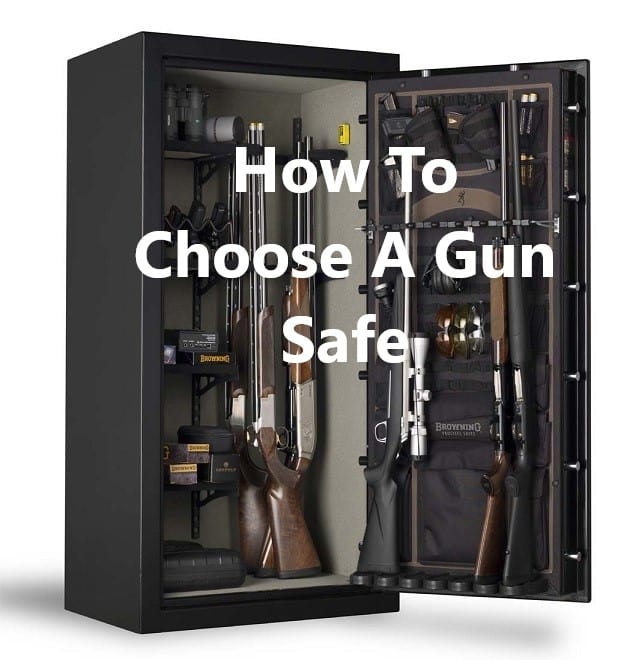If you’re a gun owner it’s important to consider the other accessories you need to keep your firearms safe, secure, and in good condition. Having a gun safe is one of the easiest ways you can accomplish those three things, but picking a good gun safe can be difficult.
Here’s what you need to know about gun safes, why you should own one, and how to pick one that will work for your firearms.
Why Gun Owners Should Have A Gun Safe
Having a gun safe is one of the best ways to keep your firearms safe, but a lot of gun owners don’t know if they need one. It might seem like a gun safe is only useful in a few rare circumstances, but the truth is they’re useful a lot more often than you might think.
For one thing, if you live with friends or family, having a gun safe can help keep your housemates safe. That’s especially important if someone you’re living with doesn’t understand basic gun safety, or isn’t old enough to be taught gun safety.
Gun safes are also a good theft deterrent and can even help protect your guns in the case of natural disasters or other problems. The best gun safes will also help keep your firearms in good condition by limiting the moisture inside the safe and helping to prevent corrosion and rust.
What You Should Know Before Buying A Gun Safe
There are a few things you should know about gun safes before investing in one. For one thing, not all gun safes are made equal. Just because something claims to be a gun safe doesn’t mean it’s actually going to do a good job of keeping your firearms safe.
That’s why we’ve included the buying guide below to help make sure you choose a good gun safe.
It’s also important to consider your insurance requirements when buying a gun safe. Many insurance companies won’t insure a safe that isn’t professionally installed, and that includes not insuring the safe’s contents if it’s damaged or stolen.
You should also remember that gun safes can often be effective storage for other valuables. Consider what items might be worth protecting in a safe and whether you want to invest in separate safes to keep different kinds of items.
If there’s any chance you’ll want to keep other items in a safe, consider getting a larger gun safe than you think you’ll need so that there is some extra space for important documents, family heirlooms, jewelry, and other valuables. It’s amazing how many gun owners wind up using their safes for other things too, so it’s important to plan for the possibility. If you have a fixed budget, see which is the best quality gun safe under $1000.
Buying Guide: What Makes A Good Gun Safe? 
Here are some of the most important considerations when it comes to picking a good gun safe for your firearms and your home.
Always remember that the most important factors are the ones that really matter for you. It’s worth spending a little more to get a safe that does its job well and meets all your criteria for a gun safe.
If you aren’t sure what features to look for, or whether a safe you’re considering is a good option, you’re in the right place.
Regardless of the features and specs of a gun safe, you should always look at the reviews for that safe. Reviews will help you tell a safe that looks good on paper but doesn’t work from a safe that is well designed and effective.
Size
One of the first things you should consider about any gun safe is its size. Some safes are designed for only a single handgun, while others can hold several long rifles, shotguns, handguns, and their accessories all in the same safe.
Deciding what size safe you need will help you narrow down your options.
It’s also important to consider the size of the space you have available to place your safe. An installed safe is almost always more secure than one that’s just resting on the floor or placed against a wall.
There are some options, like under-bed gun safes, that can help work as storage-saving devices. But, most gun safes will need at least a little of their own dedicated space available. Before you commit to buying a new gun safe you should always measure your available space to make sure it will fit where you want it.
Lastly, consider if there is anything other than firearms and firearm accessories going into your safe. Many gun owners end up using as much as 1-2 square feet of gun safe space for other valuables in addition to their firearms. If that’s a possibility for your safe, you should plan for that space.
Safe Materials
When it comes to gun safes the best materials are steel or steel alloy. There are still some safes that are made from hardened plastic or other materials, but these aren’t nearly as effective as a steel safe.
Ideally you safe should be made from 12-, 14-, or 16-gauge steel. The thicker the steel the heavier the safe will be, and the harder it will be to damage.
However, depending on where you want to install the safe you may need to choose a slightly lighter gauge steel just to make sure you’re not putting too much weight stress on your home all in one location.
Locking Mechanism
Your locking mechanism is one of the most important details of your safe. A failure-prone lock will immediately reduce the value of the safe and its effectiveness, especially in an emergency.
Here’s what you need to know about the different lock options on your gun safe.
Physical Locks
Physical locks used to be the standard for a gun safe and are still a reasonable option. However, a typical padlock-style lock may not be as secure as you want it to be.
Look for safes with cylinder locks instead of more standard locks. You should also look for safes with two physical locks if those are the only locking mechanism. That way it’s less likely your keys can be stolen, or the locks picked.
Biometric Locks
Biometric locks use biometrics like fingerprints to lock your gun safe to all but authorized users. These locks can be effective, but there are a few problems.
For one thing, all biometric locks rely on battery power to work. If the battery fails, the locks won’t open. Usually, there is a backup physical lock on the safe, but this is still a weakness of all electric locks.
Biometric locks also aren’t usually all that precise. It’s possible that a family member could still open the safe even if they aren’t authorized, just by having similar enough fingerprints. Unfortunately, almost anyone with similar prints may be able to open biometric locking mechanisms, especially the more affordable and less reliable versions.
Bluetooth/Wifi Connection
Some gun safe locks operate with a Bluetooth or wifi connection so you can remotely unlock the safe. This is a useful feature, but only when additional safety measures are taken to prevent someone opening the safe when you don’t want them to.
Password protection and only connecting to authorized devices are two of the most common ways to make a Bluetooth or wifi locking mechanism more secure.
Passcode Locks
Passcode or pin locks are some of the most secure out there, especially if you use a unique passcode for each safe. However, they are electricity-dependent, and you do have to remember the passcode to access the safe effectively.
There is also a small chance of passcode failure from the passcode getting wiped, which can make it more difficult to open the safe. Physical keys usually serve as a backup, and fortunately, this kind of error is very rare.
Electric Or Radio Frequency
The last option are electric locks that connect to a fob or another device and automatically unlock when that device is close. These are very secure options, but they are electricity-dependent. It’s also important to keep track of the fob since strong magnets can damage or erase the codes that unlock your safe.
This style of locking mechanism is best paired with a physical backup lock.
Floor/Wall/Furniture Attachment/Under bed
Getting a safe that can be physically attached to the wall or floor of your home is usually the most secure option. That’s important because thieves are more likely to steal an unattached safe than to attempt taking a secured one.
This isn’t a requirement, but it will make your safe much safer. See the best under bed gun safes for the money.
Fire Proofing
Fireproofing is a relatively rare addition to a gun safe, but it can be an important one. Insulation to help protect your firearms and other valuables is one of the best ways to protect your collection in case of a house fire.
Water Proofing
Flooding is a surprisingly common problem in many homes, and waterproofing can be an important addition to your gun safe. Plus, good waterproofing also helps keep humidity and other moisture out of your gun safe, which protects your firearms from corrosion and rust.
Installation
The last thing you should consider is how you’re going to install your safe. Many insurance companiesƒsa may require a professional installation to ensure the safe and its contents, but not all safes need it.
That said, if you plan to install the safe yourself you should have a plan since gun safes can weigh 100 lbs or more, depending on the size and style of safe.

Jerry Miculek is an experienced firearms and optics expert. Guns are not just a hobby for him, they are his passion and life. You can learn more about Jerry on our About us page.

